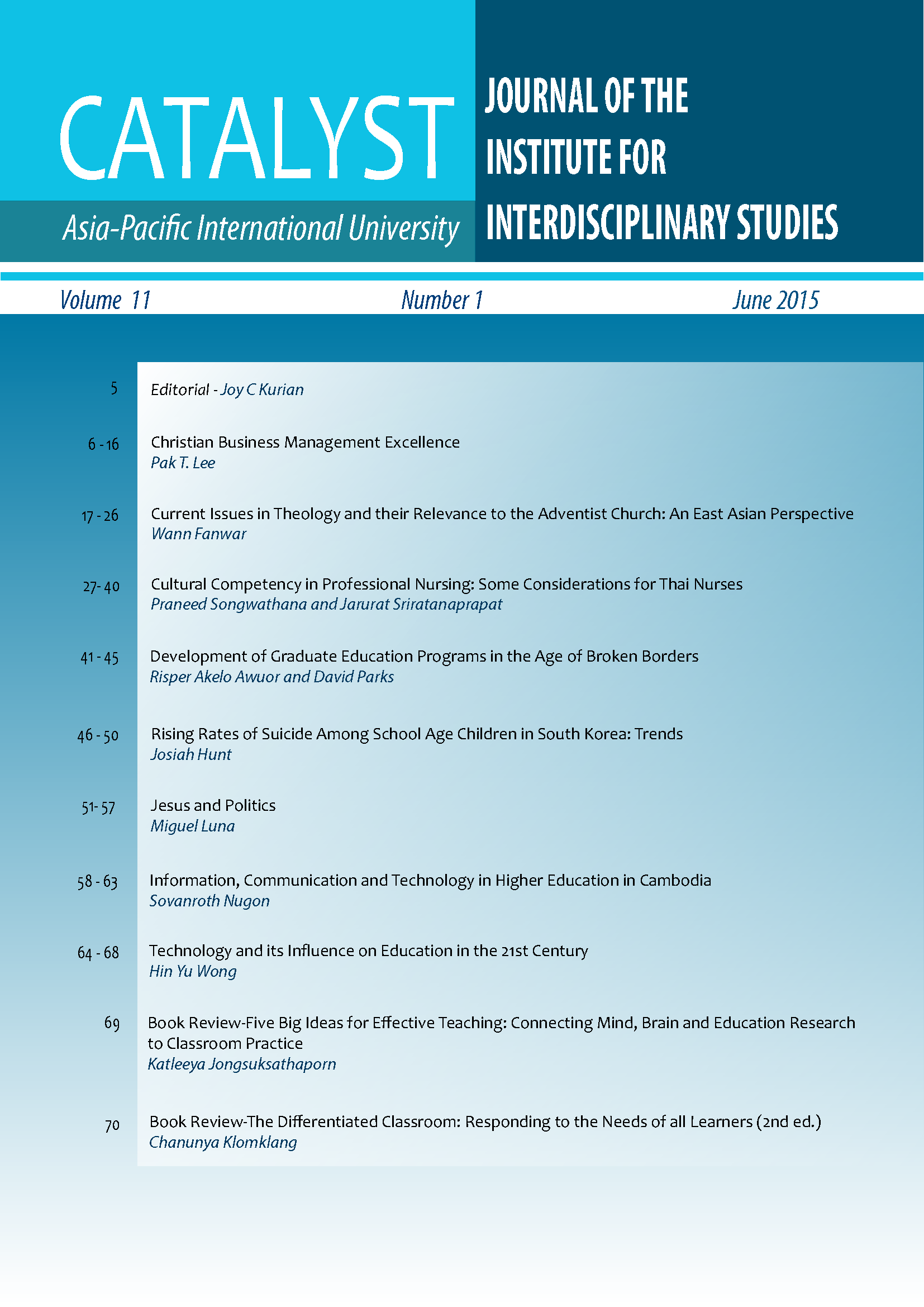Christian Business Management Excellence
Main Article Content
Abstract
The 21st century business environment demands superior performance, and high outcomes. Best management practices are seen as the ways to meet such demands and challenges. This means developing and emulating behaviours that are considered to be the best in the world. It is the belief that this type of approach will create an opportunity to bring in high monetary rewards and material gains. While this may be the secular world’s approach to achieving excellence in terms of high performance outcomes, there are organizations striving to attain management excellence from a different perspective by adopting and integrating the best practices from biblical principles and Christian literature. This approach should not be ignored. Christian business practitioners look beyond what secular organizations aim at – profits and material gains. They desire that their intended practices are consistent with God’s character, are being done with good motives and bring the high level of performance desired by the business enterprise.
Article Details

This work is licensed under a Creative Commons Attribution-NonCommercial-NoDerivatives 4.0 International License.
Copyright: Asia-Pacific International University reserve exclusive rights to publish, reproduce and distribute the manuscript and all contents therein.
References
Bruce, M. (n.d.). Biblical best practices: the call for Christian excellence. Retrieved from http://www.cbfa.org/ Bruce.pdf
Camp, R.C. (1989). Benchmarking – The search for industry best practices that lead to superior performance. ASQC Quality Press. Retrieved from: www.smthacker.co.uk/introduction_to_benchmarking.htm
Collin, J. (2003). Spirituality and servant-leadership. Retrieved from http:/www.greenleaf.org/leadership/ read-about it/articles/spirituality-and-Servant Leadership.htm
Daft, R. & Marcic, D. (2009). Management: the new workforce (6th Ed.). Singapore: South-Western.
Dahlgaard-Park, S. & Dahlgaard, J. (n.d.). Dreaming excellence. Retrieved from www.iei.liu.se/q/filarkiv/ phdcourses/.../DreamingExcellencedoc070707_.pdf
Dunbebin, C. (1999). Servant leadership: A new paradigm for successful administration. Adventist Education, pp. 5-9.
Foster, S. (2010). Managing quality: Integrating the supply chain (4th Ed.). New York: Pearson Education.
Hill, C.W.L. & McShane, S.L. (2008). Principles of management. Boston: McGraw-Hill.
Hodgetts, R. M., Luthans, F., & Lee, SM. (1994). New paradigm organizations: From total quality to learning to world class. Organization Dynamics, 22(3), 5-19.
Inrig, G. (1985). A Call to excellence. Illinois: Victor Books Wheaton.
Leonard, D. & Denney, B. (2007). Aspect of Baldrige. Quality Digest’s Quality Insider. Retrieved from www. qualitydigest.com/inside/quality-insider-article/aspects-baldrige
Nyambegera, S. M. (2005). Human resource management: A biblical perspective. Nairobi: UZIMA Publishing House.
Oberholster, B. (n.d). Management: A Christian perspective. Institute of Christian Teaching, Education Department of the Seventh-Day Adventist. Retrieved from www. Aiias.edu/ict/vol_12/12cc_229-243. htm
Peters, T. J. & Waterman, R. H. (1982). In search of excellence: Lessons from America’s best run companies. London: Harper Collins Publishers.
Poitras, J. G. (2005). Achieving excellence in bible school administration. Reaching through Teaching Ministries. Retrieved from http://www.gatsonline.org/uploads/3/9/9/8/39985359/achieving_excellence_in_ bible_school_administration_-_full%E2%80%A6.pdf
Robbins, S.P. & Judge, T.A. (2009). Organizational behavior (13th Ed.). USA: Prentice Hall.
Rothman, H. K. (1992). You need not be big to benchmark. Nation’s Business, 64.
Rush, M. (1983). Management: A biblical approach. Springfield: Life Publishers International.
Shelton, C.D., Darling, J.R. & Walker, W.E. (2002). Foundations of organizational excellence: Leadership values, strategies, and skills. Retrieved from lta.hse.fi/2002/1/lta_2002_01_a2.pdf
Shumate, D. R. (1998). Bible administration: What is it and why is it important? Frontline, 8(4), 3.
Walleck, A. S. & Leader, C. A. (1991). Benchmarking world-class performance. McKinsey Quarterly 1, 3-23.


